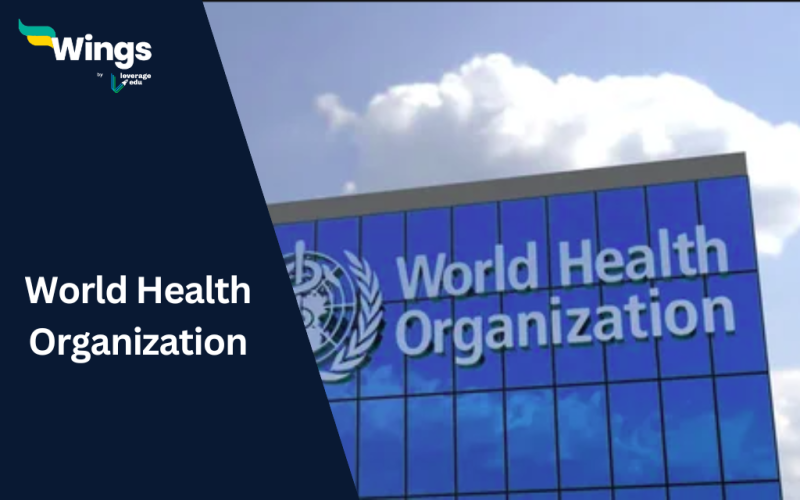In the list of international organizations for Health, the World Health Organization (WHO) stands out as a pivotal entity. Aspiring UPSC candidates frequently encounter questions related to WHO, making it crucial to delve into its functions, history, goals, and the latest news concerning this international health Organization. In this blog, we have mentioned some notes to help aspirants of the Civil Services Exam. These UPSC Notes related to the World Health Organization will help you essentially stay updated with WHO and how it functions in the most precise manner.
Table of Contents [show]
What is World Health Organization?
WHO (World Health Organization), a specialized agency of the United Nations, is entrusted with overseeing global public health matters. It was founded on 7 April 1948. The headquarters of WHO is in Geneva, Switzerland. The objective of WHO is to “promote health, keep the world safe and serve the vulnerable so everyone, everywhere can attain the highest level of health”. The current Director-General of the World Health Organization is Tedros Adhanom Ghebreyesus.
For UPSC aspirants, understanding WHO is essential, especially given its prominence in recent news revolving around the COVID-19 pandemic.
Must Read: What is the Full Form of WHO?
WHO’s Recent Developments
- Keeping abreast of the World Health Organization’s latest news is vital. In response to the COVID-19 pandemic, WHO established the Independent Panel for Pandemic Preparedness and Response (IPPR).
- In a noteworthy turn of events, the United States, in July 2020, expressed its intent to withdraw from WHO. However, Joe Biden reversed the decision and continued to fund WHO.
- Investigative mission to China by a WHO team in February 2021. Their mission was to trace the origins of the COVID-19 virus, which was believed to have originated in the Wuhan Virology Institute.
World Health Organization History
To truly grasp the significance of WHO in the world of international health organizations, we must journey back to its origins-
- In 1945, during the United Nations Conference on International Organization, Szeming Sze, a delegate from the Republic of China, proposed the creation of an international health organization under the United Nations.
- This proposal led to the establishment of WHO in 1948, making it the first specialized agency of the United Nations to gain universal membership.
World Health Organization Goals
World Health Organization goals underscore its commitment to global well-being. These objectives encompass eradicating diseases, such as smallpox in 1980 and the ongoing efforts to eliminate polio, reducing cases by an impressive 99% since 1988.
In addition to infectious diseases, WHO also directs its focus toward non-communicable diseases, including heart disease and cancer. Moreover, WHO’s efforts extend to maternal and infant healthcare, hygienic food and water access, and addressing health disparities.
Governance of WHO
To understand, how WHO operates on the global stage, one must examine its governance structure-
- The organization is headed by a Director-General and is headquartered in Geneva. With 194 member countries, full membership is secured through the ratification of the Constitution of the World Health Organization.
- The apex decision-making body, the World Health Assembly, comprises delegations from all member states. This assembly shapes WHO’s policies and priorities. India, too, plays a significant role as it was elected to the Executive Board of WHO during the 73rd World Health Assembly, with Union Health Minister Harsh Vardhan assuming the chairmanship.
Also Read: World Health Day 2023 | Leverage Edu
Contributions of WHO in India
India enjoys a robust partnership with WHO, with several initiatives aimed at improving public health-
- The Country Cooperation Strategy (CCS) developed jointly by the Ministry of Health and Family Welfare of the Government of India and WHO strives to enhance health and equity in the country.
- Furthermore, India has set ambitious goals for malaria elimination through the National Strategic Plan for Elimination of Malaria (2017-2022). This plan aligns with the World Health Organization’s Global Technical Strategy for Malaria (2016-2030) and aims to eliminate malaria by the year 2027.
FAQs
WHO plays a pivotal role by directing and coordinating international health efforts, collaborating with other organizations, assisting governments, and providing technical assistance and aid during emergencies.
Understanding WHO is essential for UPSC exams, as it’s an important international organization. Familiarity with its functions, goals, and contributions is beneficial for aspirants.
Certainly! WHO’s achievements include eradicating smallpox, reducing polio cases by 99%, and making significant contributions to malaria control, maternal and child healthcare, and disease control.
WHO is governed by its Director-General and the World Health Assembly, which consists of delegations from all member states and shapes the organization’s policies.
Hope you have gotten all the relevant information about the World Health Organization! If you want to know more about topics like this, then visit our general knowledge page! Alternatively, you can also read our blog on general knowledge for competitive exams!
 One app for all your study abroad needs
One app for all your study abroad needs















 45,000+ students trusted us with their dreams. Take the first step today!
45,000+ students trusted us with their dreams. Take the first step today!
